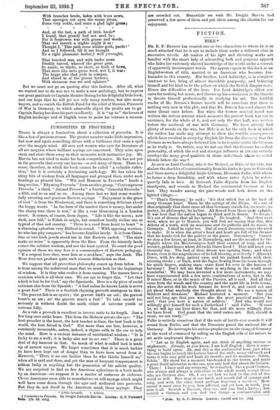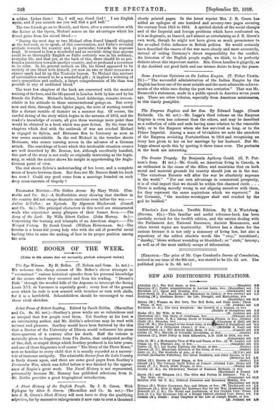FICTION.
MIKE.*
Ma. E. F. BENSON has created one or two characters to whom he is so much attached that he is apt to include them under a different alias in successive novels. All readers of his light and diverting works are familiar with the smart lady of astounding bulk and gorgeous apparel who hides her extremely shrewd knowledge of the world under a torrent of apparently inconsequent words. She appears again in this book as an Englishwoman of title, married to an American who becomes Am. bassador to this country. Her brother, Lord Athbridge, is in complete contrast to her, being of almost incredible pomposity, and believing himself and his kind to be tho pillars on which the British Empire rests.' Hence the difficulties of the hero. For Lord Ashbridge's eldest sons cares for nothing but music, and throws up his commission in the Guards to devote himself professionally to studying his art. Tho faithful reader of Mr. Benson's former novels will be conscious that there is nothing very new in this plot, and that Mr. Benson has used almost tho. same theme once before. But when the former musical novel was written the serious interest which animates the present book was not in existence, for the whole of it, and not only the first half, was written before the outbreak of war with Germany. We have already had plenty of novels on the war, but Mike is so far the only book in Which the author has made any attempt to show the terrible consequences which have resulted in everyday English life from the discovery that tho German as we have always believed him to bo is quite unlike the German as ho really is. Or, rather, may we not say that the German has a dual personality, of which the evil and stronger influence at prozent entirely overlays the many good qualities in those individuals whom we called friends before the war ?
As soon as Lord Comber, who is the Michael, or Mike, of the title, has shaken the shackles of conventionality from his limbs, he goes to Baireuth and there meets a delightful Anglo-German, Hermann Falbe, with whom he forms a deep friendship, and with whose sister Sylvia ho subse- quently falls in love. At Baireuth Falbo departs from his English standpoint, and reveals to Michael the sentimental German at his best. They wander among the pine-woods and look down on the lighted village :— " ' That's Germany,' he said ; it's that which lies at the back of every German heart. There lie the springs of the Rhino. lee out of that originally that there came all that Germany stands for, its music, its poetry, its philosophy, its kultur. All flowed from these quiet uplands. It was here that the nation began to think and to dream. To dream ! It's out of dreams that all has sprung.' He laughed. ` And then next. week, when we go to Munich, you will find mo saying that this, this Athens of a town, with its museums and its galleries and its music, is Germany. I shall be right too. Out of much dreaming comes tho need to make. It is when the artist's head and heart are full of his dreams that his hands itch for the palette or the piano. Nuremberg I Cannot we atop a few hours, at least, in Nuremberg, and see the meadow by tho Pegnitz where the Meistersingers held their contest of song, and the wooden, gabled house where Albrecht Darer lived ? That will teach you Germany too. The bud of their dream was opening then ; and what flower, even in the magnificence of its full-blowing, is so lovely ? Albrecht Darer, with his deep, patient eyes, and his patient hands with their unerring stroke ; or iach, with the fugue flowing from his brain through his quick fingers, making stars—stars fixed for ever in the heaven of harmony I Don't tell me that there is anything in the world more wonderful ! We may have invented a few more instruments, we may have experimented with a few more combinations of notes, but in tho B minor Mass, or in the music of the Passion, all is said. And all that came from the woods and the country and the quiet life in little towns, when the artist did his work because he loved it, and cared not one jot about what anybody she thought about it. We are a nation of. thinkers and dreamers.' Michael hesitated a- moment. ` But you said not long ago that you were also the most practical nation,' ho said, ' that you were a nation of soldiers.' And who would not willingly give himself for such a Fatherland ? ' said Falbe. If need be, we will lay our lives down for that, and die more willingly than we have lived. God grant that the need comes not. But, should it come, we are ready.'
Falbe is entirely conscious that if the note of battle ever sounds it will/ sound from Berlin, and that the Prussians guard the national life of Germany. He interrupts his serious prophecies on the rising of Germany at the word of command by calling on the English aide of his nature to set aside unpleasant thoughts :— " Let us be English again, and not think of anything serious or unpleasant. Already, as you Low, I am half English ; there is some. t to build upon. Ah, and this is the sentimental hour, just when the sun begins to touch the horizon line of the stale, weary old earth and turns it into rosy gold and heals its troubles and its weariness. Behan.' He stood for a moment bareheaded to the breeze, and made a great florid salutation to the sun, now only half-disk above the horizon. There ! I have said my evensong,' ho remarked, like a good German, who always and always is ridiculous to the whole world, except those who are German also. Oh, I can see how wo look to the rest of the world so well. Beer mug in one hand, and mouth full of sausage and song, and with the other hand perhaps fingering a revolver. How unreal it must seem to you, how effected, and yet how, in truth, you. miss it all. Scratch a Russian, they say, and you find a Tartar ; but. scratch a German and you find two things—a sentimentalist and • Nita By E. P. Eamon. London ; Cassell and Co. 14Q1
a soldier. Lieber Gott ! No, I will say, Good God I I am English again, and if you scratch me you will find a golf ball.' " The two friends go on to Munich, and there, after a conversation with the Kaiser at the Opera, Michael muses on the advantages which his friend gains from his mixed blood :- "During the next day or two Michael often found himself chipping at the bed-rock, so to speak, of this conversation, and Falbe's revealed attitude towards his country and, in particular, towards its supreme head. It seemed to him a wonderful and an enviable thing that anyone could be so thoroughly English as Falbe certainly was in his ordinary, everyday life, and that yet, at the back of this, there should lie so pro- found a patriotism towards another country, and so profound a reverence to its ruler. In his general outlook on life, his friend appeared to be entirely of one blood with himself, yet now on two or three occasions a chance spark had lit up this Teutonic beacon. To Michael this mixture of nationalities seemed to be a wonderful gift ; it implied a widening of one's sympathies and outlook' a larger comprehension of life than was possible to any of undiluted blood."
The next few chapters of the book are concerned with the musical training of the hero, and the life passed in London both by him and by his friends the Falbes. Michael's father, Lord Ashbridge, remains irrecon- cilable in his attitude to these unconventional goings-on. But every now and then, through these lighter pages, the note of warning sounds like a distant rumble of thunder on a summer day. Of course, the careful dating of the story which begins in the autumn of 1913, and the reader's knowledge of events, all give these warnings more point than would be obtained in a book which was pure fiction. By the time the chapters which deal with the outbreak of war are reached Michael is engaged to Sylvia, and Hermann flies to Germany as soon as war seems unavoidable. In the end Michael in the trenches shoots Hermann, who comes running across in the advance of a German attack. The searchings of heart which this intolerable situation creates are well described by Mr. Benson, but, although excellently handled, this part of the story is not really so originally interesting as the begin- ning, in which the author shows his insight in apprehending the Anglo. German point of view. The end shows Sylvia's understanding of her lover, and a complete union of hearts between them. But does not Mr. Benson finish his book too soon ? Could any good come from a marriage founded on such deep cross-currents of tragedy



































 Previous page
Previous page